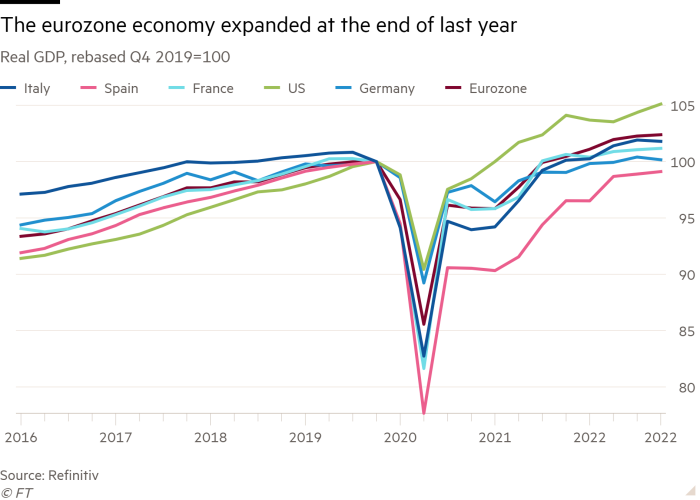The eurozone economy grew in the final quarter of 2022 despite economists’ predictions of a downturn, boosting hopes that the region will avoid a recession.
Milder weather and government support cushioned the impact of soaring energy prices, helping the region’s economy expand by 0.1 per cent between the third and fourth quarter, according to official data published by Eurostat on Tuesday.
The expansion was better than the 0.1 per cent drop forecast by economists polled by Reuters. The same survey had also predicted another quarter of contraction during the first three months of 2023.
Bert Colijn, senior economist at ING, the bank, said the region’s economy was showing “incredible resilience” in the face of the energy crisis triggered by Russia’s invasion of Ukraine.
Tuesday’s data means that the region managed to grow in each quarter of 2022 and by 3.5 per cent over the course of the year.
John Leiper, chief investment officer at Titan Asset Management, said the figures were “quite an achievement” given the headwinds facing the region.
Businesses and households also had to contend with higher borrowing costs, as the European Central Bank raised interest rates by 2.5 percentage points during the second half of last year to combat inflation that peaked at 10.6 per cent.
Only a few months ago, economists had forecast a deep recession and energy shortages. But a less cold winter than feared, falling gas prices and generous government support have all helped avoid that scenario.

Tuesday’s figures are likely to feature in the considerations of the ECB, which is seeking to ensure that inflation returns to its 2 per cent goal. Markets expect the ECB governing council to increase the benchmark deposit rate by 0.5 percentage points to 2.5 per cent when it meets on Thursday.
The central bank’s resolve is also likely to be bolstered by the latest data on prices. French inflation accelerated in January while Spain’s core consumer price growth, which strips out food and energy, rose to the highest level on record.
Earlier in the day, data showed France’s economy also managed to avoid falling into recession.
The eurozone’s second-largest economy grew by 0.1 per cent between the third and fourth quarters, France’s national statistics bureau Insee said. The figure beat economists’ expectations of no change.
Tullia Bucco, economist at UniCredit, said the French data was “encouraging news”. However, Charlotte de Montpellier, senior economist at ING, said this year would be “characterised by near-stagnation” of France’s economy.
Germany reported a fourth-quarter contraction of 0.2 per cent on Monday, placing the eurozone’s largest economy on the brink of recession.
Data published on Tuesday showed Italy’s economy also contracted, but by just 0.1 per cent — a smaller amount than feared. Spain’s economy expanded by 0.2 per cent, according to figures published last week.
But detailed national data from France and Spain showed a sharp fall in imports, suggesting demand among businesses and households is weakening. Household consumption fell sharply in both countries, with Germany also reporting that private spending was the driver of the fall in GDP.
The eurozone figure was also boosted by a strong performance by Ireland, which recorded growth of 3.5 per cent. The region’s GDP would have not grown without Ireland’s contribution.
“The worst scenarios for this winter have been avoided,” Colijn said. “But the economy remains sluggish.”

